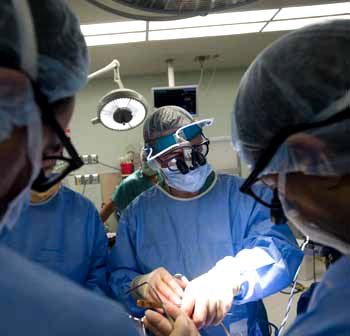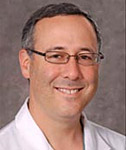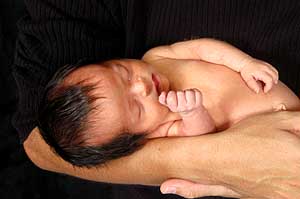Pediatric cardiothoracic surgery: Healing the tiniest hearts

Gary Raff is one of an elite corps of highly skilled pediatric cardiothoracic surgeons nationwide who are able to perform complex surgeries on some of the tiniest and most fragile patients who suffer from birth defects.
Gary Raff recalls with certainty the point at which he chose to become a physician.
He was a little boy, sitting in his own pediatrician's office.
"I went to medical school because my pediatrician was a superb human being and a superb doctor," recalls Raff, a professor of pediatrics and surgery and chief of the division of pediatric cardiothoracic surgery at UC Davis Children's Hospital.
That superb human being set Raff's feet upon the path that would eventually lead him to become the sole pediatric cardiothoracic surgeon in the Sacramento region to perform surgery to correct highly complex congenital cardiac malformations in infants and very young children.
Training with the best of the best
The path also includes some of the most highly respected medical institutions in the nation, including two years of fellowship in cardiothoracic surgery at the Children's Hospital of Philadelphia, known simply as "CHOP," widely regarded as the nation's best children's hospital.
Raff, a native New Yorker, began his medical career at Hahnemann University in Philadelphia, already determined to become a pediatrician. But it was not until his pediatric cardiothoracic surgery residency at CHOP that Raff knew he had found his true calling.
"I saw the most complex procedures that you could see, including heart-lung transplants," Raff said. "Whatever you could do with a heart they were doing it and with great success."
After his residency, Raff then performed a two-year-long fellowship at CHOP under the direction of legendary pediatric cardiothoracic surgeon Thomas Spray, who holds an endowed chair in pediatric cardiothoracic surgery and is now the chief of the division at the University of Pennsylvania School Of Medicine.
"He is one of the preeminent heart surgeons in the country, and in this coming year he's going to be the president of the American Association of Thoracic Surgeons. There is no one who I've worked with who is in his league," Raff said.
 "Families with infants with complex congenital heart defects are under a lot of stress and pressure. It's better for infants and for families to have friends and loved ones close at hand during such a challenging time in their lives."
"Families with infants with complex congenital heart defects are under a lot of stress and pressure. It's better for infants and for families to have friends and loved ones close at hand during such a challenging time in their lives."— Gary Raff, pediatric cardiothoracic surgeon
Raff is one of an elite corps of highly skilled pediatric cardiothoracic surgeons nationwide who are able to perform complex surgeries on some of the tiniest and most fragile patients who suffer from birth defects like hypoplastic left heart syndrome and transposition of the great arteries. Many of these infants would die if not treated in the first hours or days of life.
Performing the most complex procedures
Raff explained that, like most people, these babies' hearts are roughly the size of their fists -- but their fists are about the size of a small strawberry.
In hypoplastic left heart syndrome, all of the structures on the left side of the heart — which is the side that receives oxygen-rich blood from the lungs and pumps it out to the body — are severely underdeveloped. This results in a situation where the left side of the heart is completely unable to support the circulation needed by the body's organs.
Surgery for hypoplastic left heart syndrome involves several procedures in which a series of operations, usually three, are performed to reconfigure the child's cardiovascular system to be as efficient as possible. Subsequent surgeries are performed at three to six months of age and later at two to three years of age. Children with hypoplastic left heart syndrome are also candidates for heart transplantation.
The condition is very rare, accounting for only 7 to 9 percent of all congenital heart defects.
A highly collaborative enterprise
Raff, who until recently also practiced at the University of California, San Francisco, Children's Hospital, said he took on the role of the chief at UC Davis recently because he's excited about opportunity to develop a relatively young program.
"I can make a huge impact here," Raff said. "I've always wanted to build and grow a program, and it's exciting to be in a region that is growing with a growing pediatric population."
Pediatric cardiology and cardiothoracic surgery is a highly interdisciplinary enterprise, Raff noted, requiring the expertise of physicians in pediatric echocardiography, cardiology, pediatric critical care medicine and pediatric anesthesia, as well as specially trained nurses, in order to be successful.
He said that his work is also dependent upon having the most up-to-date technology available such as the extra-corporeal membrane oxygenation (ECMO) of the UC Davis Children's Hospital pediatric intensive care unit (PICU), which makes it possible to provide the continuum of care required for these highly complex patients.

UC Davis Children's Hospital offers expertise in a wide variety of disciplines to support these complex infants' other needs, such as neonatologists experienced in managing very fragile babies.
In addition, UC Davis Children's Hospital offers expertise in a wide variety of disciplines to support these complex infants'other needs, such as neonatologists experienced in managing very fragile babies.
Meeting the region's needs at home
Raff said that he believes that it's important for people in the region to have easy access to services for highly complex neonatal heart surgery in their own community.
"This is a large enough region that they really should have their own program in their own community," Raff said. "Families with infants with complex congenital heart defects are under a lot of stress and pressure. It's better for infants and for families to have friends and loved ones close at hand during such a challenging time in their lives."
Another feature of the UC Davis program, Raff said, is its services for children with hypoplastic left heart syndrome and other complex congenital heart defects that monitors their well being after they leave to go home.
The babies are sent home with an oxygen monitoring device called a pulse occimeter and a scale. Drops in oxygen saturation or weight tell families it's time to have their infants evaluated for subtle changes in their complex physiology.
"We're working to help these kids on several levels," Raff said. "We're expanding our diagnostic, therapeutic, and ongoing care for these patients. We want to ensure that when patients come to us they know that they're receiving the best possible care for their infant or child."
